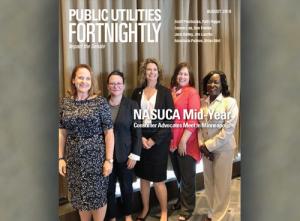Elin Katz and Jack Bailey Spoke Out in August's PUF

Connecticut Consumer Counsel and NASUCA President Elin Swanson Katz: Hey, Electric Sector, give me a minute, will ya? There’s someone here I’d like you to meet. I’ve been trying to get the two of you in a room together for years. Electric Sector, meet Muni Broadband…
As you know, Electric Sector, with your visions and plans for Smart Cities, Smart Communities, Smart Grid, Smart Homes, Smart Meters, and the Internet of Things, you would like to see all kinds of internet-connected devices throughout the communities that you serve, as well as on the poles, at substations, along transmission lines, and at other key points.
Those devices and others yet to be discovered will collect data, lots of it, and in preparation you need to focus on the demands and opportunities presented by that data. For instance, how will you move, store, manage, protect, and perhaps most important, provide mutual value and benefits to your company and customers from all of that data?...
Like yourself, Electric Sector, Muni Broadband has a very similar need for community-wide internet access. Broadband has become an essential service, almost as important to many as electricity. Just ask your kids.
At the same time, there are millions of residents and businesses across the United States without adequate access to affordable broadband services, a critical problem known as the Digital Divide. This need is especially acute in rural areas and low-income minority urban centers…
So, today’s leaders that are working on muni networks display the same kind of gumption that we saw from leaders in the 1900s, who helped revolutionize the electric industry and our country in general. Now, almost all Americans have electricity. A hundred years ago, that wasn’t even close to a reality.
So, here’s why I thought you two should meet. You both will benefit from ubiquitous affordable high-speed broadband to satisfy the great demand in the market for this service. Wouldn’t it be helpful to the Electric Sector to partner with these thoughtful, gumption-filled municipal leaders and solve this problem of uneven access to broadband together?
NuScale VP Jack Bailey: We are the only small module reactor vendor that is having their design certification application reviewed by the NRC, not only in the United States, but in the world. Nobody else has submitted one of those applications.
We've had that application in review for over a year now. We're through the most difficult and intensive phase, phase one. This means we've essentially met all challenges so far, and we're ahead of schedule. We expect that NuScale’s design will be approved by September 2020 with its first operational plant in Idaho by the mid-2020s.
Our first customer is the Utah Associated Municipal Power Systems. They are going to move forward with a site that they have selected on the Idaho National Laboratories Reservation. They would do a site license and use this technology certification or license to go with that to make an application to build and operate a plant…
We think we can build thirty-six of our reactor modules in the factory per year initially. As orders increase, we can build more than one factory. We're not only talking about the United States. NuScale is working to put the U.S. on a path to be a leader internationally in the global small modular reactor race, a market estimated to be worth as much as five hundred and fifty billion dollars.
We're talking about a very large world market, so we could expand that manufacturing capability into other areas. The best case is that by 2030 we will build several of these plants. After 2030, we think we could build hundreds of these modules to supply plants around the world. Even with just a small share of the global small module reactor market — say ten to twenty percent — NuScale would need to be manufacturing roughly three to six power modules every month to keep up with the demand. That’s about three to six billion dollars annually for a manufacturing business.
Work at a utility? Or a large concern of another type? We’re phasing out individual subscriptions to Public Utilities Fortnightly at any organization with over a hundred employees. But, no worries. We’ll make it easy and economical for your company to sign up for a membership to cover any employee.
Steve Mitnick, Editor-in-Chief, Public Utilities Fortnightly, and President, Lines Up, Inc.
E-mail me: mitnick@fortnightly.com



